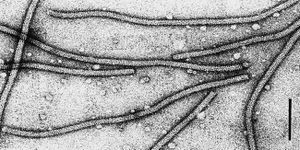Potato virus X
| Literature database |
|---|
| 240 articles sorted by: |
| • year (descending) |
| • research topics |
| • countries/regions |
| • host plants |
| • list of antagonists |

Author(s): D.-E. Lesemann
Source: ICTV reports

Author(s): Gerald Holmes, Valent USA Corporation
Source: IPM Images
Potato virus X (PVX)
The virus occurs world-wide and is the most widespread potato virus. It also infects related crops like tomatoes and tobacco. Yield losses are generally around 15%, but can be higher when plants are co-infected with other viruses. Symptoms depend on the strain but are typically mild or not visible on potato. In tobacco it causes mottling or necrotic spotting, in tomato it causes mosaic and slight stunting. The virus is usually mechanically transmitted by contact between infected and healthy plants. This can, for example, happen when contaminated farm equipment passes through the crop. Infected tubers are also infection sources. They will spread the disease and produce infected plants.
| Vernacular names | |
|---|---|
| • Deutsch: | Kartoffelvirus X |
| • English: | Potato virus X |
| • Español: | virus X de la papa |
| • Français: | virus X de la pomme de terre |
Management relies mainly on the use of certified, disease-free seed potatoes. Other options include the use of resistant cultivars and the disinfection of farm equipment. PVX is the type species of the genus Potexvirus. The particles are flexuous and filamentous, between 470-580 nm long. They contain a positive-stranded RNA genome, 6-7 kb large.